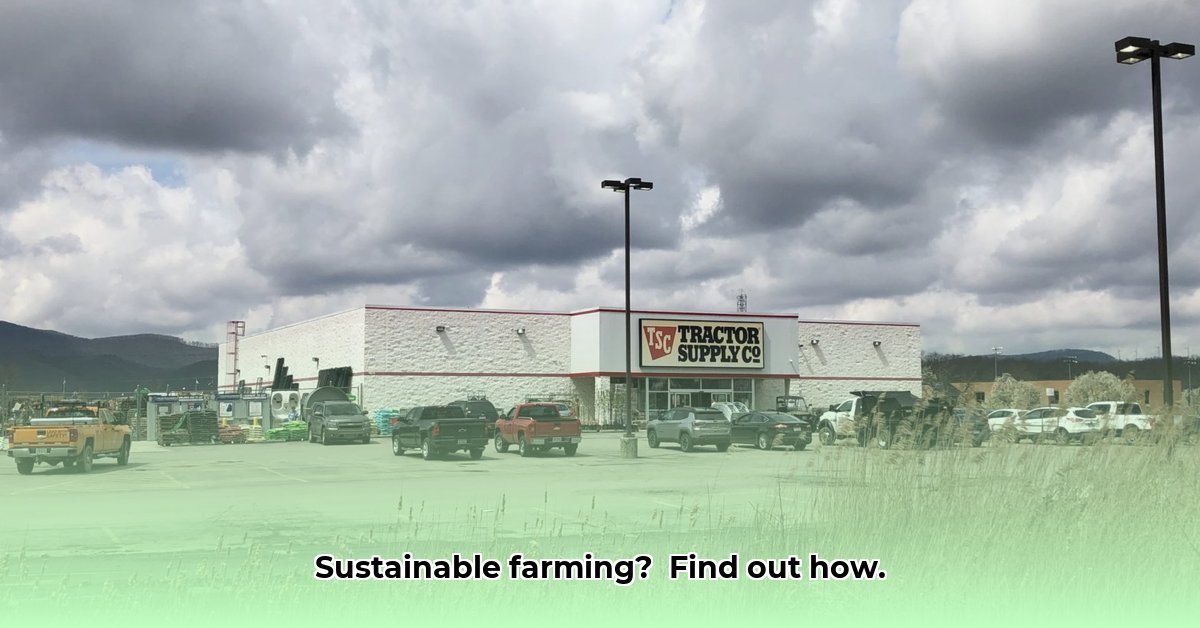
Tractor Supply's Elkins, West Virginia, location presents a significant, yet untapped, opportunity to support local sustainable agriculture. While the store offers many products useful for sustainable farming, a strategic shift in marketing and collaboration is needed to fully realize its potential. This article analyzes the current situation, identifies limitations, and proposes actionable recommendations to bridge the gap between Tractor Supply's offerings and the needs of the local sustainable farming community. For similar initiatives elsewhere, see this example from another Tractor Supply store here.
Tractor Supply's Current Offering for Sustainable Agriculture
Tractor Supply in Elkins stocks a range of products relevant to sustainable agricultural practices. These include seeds (although the availability of organic options requires further investigation), fencing materials for livestock management, and irrigation systems for water conservation. However, the store's current marketing strategy doesn't explicitly highlight these items as solutions for sustainable farming. This represents a considerable missed opportunity to attract environmentally conscious farmers and gardeners. A comprehensive inventory analysis, comparing the availability of sustainable products at Tractor Supply to competitors in the region (such as local nurseries or feed stores), is crucial to assess its competitive positioning and identify potential gaps. This data could reveal whether Tractor Supply is effectively serving the growing demand for sustainable agricultural resources in the Elkins area. A critical question arises: What percentage of Tractor Supply's Elkins inventory directly supports sustainable farming practices? Further investigation is needed to answer this question definitively.
Local Context: Challenges and Opportunities in Elkins, WV
The agricultural landscape of Elkins, WV presents both challenges and opportunities for sustainable farming. Specific soil types, water availability, and prevailing weather patterns influence the feasibility and effectiveness of various sustainable practices. Soil testing results, for example, could highlight the need for specific soil amendments or water management techniques. A detailed understanding of these local conditions is critical for tailoring effective sustainable agriculture strategies. Similarly, the existing farming practices in the region could influence the adoption rate of new sustainable techniques. What are the key constraints faced by local farmers in transitioning to sustainable agriculture? This question requires local farmer input to properly assess the challenges and potential solutions.
Actionable Recommendations: A Collaborative Approach
To maximize Tractor Supply's role in supporting sustainable agriculture in Elkins, a collaborative approach involving the store, local farmers, and government/NGOs is essential.
Short-Term Actions (Within 1 Year)
Inventory Analysis and Product Highlighting: Tractor Supply should conduct a thorough inventory analysis to identify all products relevant to sustainable farming. These items should be clearly highlighted in-store and online, with improved descriptive tags emphasizing their eco-friendly attributes. This simple step could significantly increase visibility and sales.
Staff Training and Education: Invest in training programs for staff on sustainable agricultural practices, including proper product knowledge and effective customer advice. Empowered staff can act as valuable resources to customers seeking sustainable solutions.
Community Engagement: Actively participate in local farmers' markets and agricultural events. Offer workshops and demonstrations on sustainable farming techniques, using Tractor Supply products as examples. This creates a direct connection with the community.
Long-Term Actions (3-5 Years)
Dedicated Sustainability Section: Create a dedicated in-store and online section showcasing products specifically designed for sustainable farming. This centralized location improves customer navigation and reinforces Tractor Supply's commitment to sustainable agriculture.
Partnerships with Local Organizations: Build strong relationships with local agricultural organizations, universities, and NGOs. These partnerships facilitate knowledge sharing, support collaboration on educational initiatives, and allow for a broader reach within the community.
Sustainable Sourcing: Explore sourcing more sustainable products, including those from local suppliers. This fosters local economic growth while aligning with the store’s sustainability goals.
Risk Analysis and Mitigation
While the potential benefits are significant, several risks need consideration:
| Risk Factor | Likelihood | Impact | Mitigation Strategy |
|---|---|---|---|
| Insufficient Demand for Sustainable Products | Moderate | Moderate | Begin with pilot programs and gradually expand based on demand. |
| Competition from Specialty Retailers | Low | Low | Differentiate by offering a wider range of products and services. |
| Supply Chain Disruptions | Moderate | High | Diversify supply sources and build strong relationships with suppliers. |
| Lack of Staff Knowledge | High | Moderate | Implement ongoing training programs for all relevant staff members. |
By proactively addressing these risks and implementing the proposed recommendations, Tractor Supply can significantly enhance its contribution to sustainable agriculture in Elkins, WV. The key to success lies in collaboration and a strategic commitment to supporting the needs of the local farming community. The potential rewards—a healthier environment and a thriving local food system—make this a worthwhile endeavor.